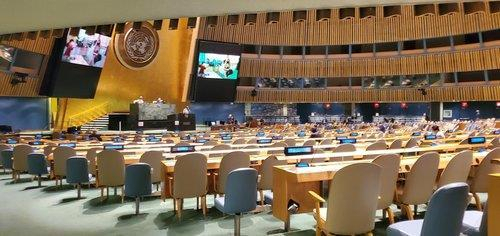
NEW YORK -- South Korean diplomats on Monday made their final pitch for Seoul's bid for a nonpermanent seat on the United Nations Security Council.
South Korea, which last sat on the council in 2013-2014, aims to return to the council for 2024-2025, and the UN will vote on the bid on Tuesday.
If elected, it will mark the third time for South Korea to serve as one of the 10 nonpermanent UNSC members. Previously, South Korea had served the seat during the 1996-1997 term.
South Korea hopes to return to the council as it seeks to expand its roles in UN activities for international peace and security. It would also help reduce tensions on the Korean Peninsula, Seoul diplomats have said.
North Korea, which has shown little signs of returning to dialogue, has ramped up developments of its nuclear and missile programs. In late March, North Korean leader Kim Jong-un ordered the expansion of the production of weapons-grade nuclear materials for an exponential increase in its arsenal.
In a recent interview with Yonhap News Agency, South Korea's Ambassador to the UN Hwang Joon-kook said Seoul would "gain a foothold" to play a leading role in global affairs if it wins a seat on the council.
If South Korea returns to the council, it "will serve as an opportunity to expand our diplomatic horizons," Hwang said.
The UN body is run by five veto-wielding permanent members -- Britain, China, France, Russia and the United States -- and 10 nonpermanent members, who are elected to serve two-year terms.
To win a nonpermanent seat, a country needs to secure at least two-thirds of the votes from the countries attending the general assembly, out of the 193 member states. (Yonhap)





![[Graphic News] Number of coffee franchises in S. Korea rises 13%](http://res.heraldm.com/phpwas/restmb_idxmake.php?idx=644&simg=/content/image/2024/05/02/20240502050817_0.gif&u=)



![[Robert J. Fouser] AI changes rationale for learning languages](http://res.heraldm.com/phpwas/restmb_idxmake.php?idx=644&simg=/content/image/2024/05/02/20240502050811_0.jpg&u=)








![[Eye Interview] 'If you live to 100, you might as well be happy,' says 88-year-old bestselling essayist](http://res.heraldm.com/phpwas/restmb_idxmake.php?idx=652&simg=/content/image/2024/05/03/20240503050674_0.jpg&u=)
